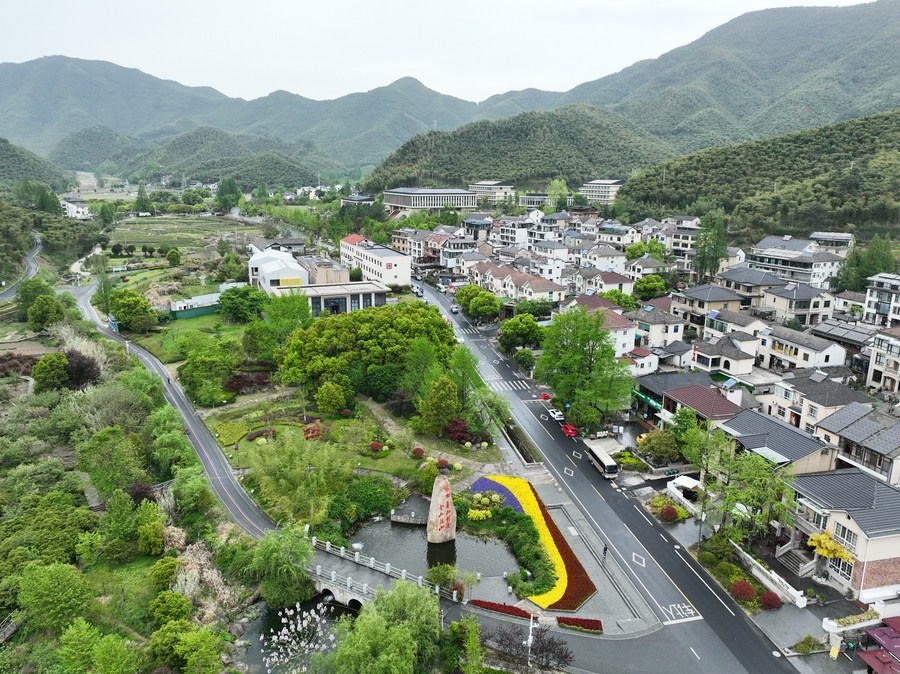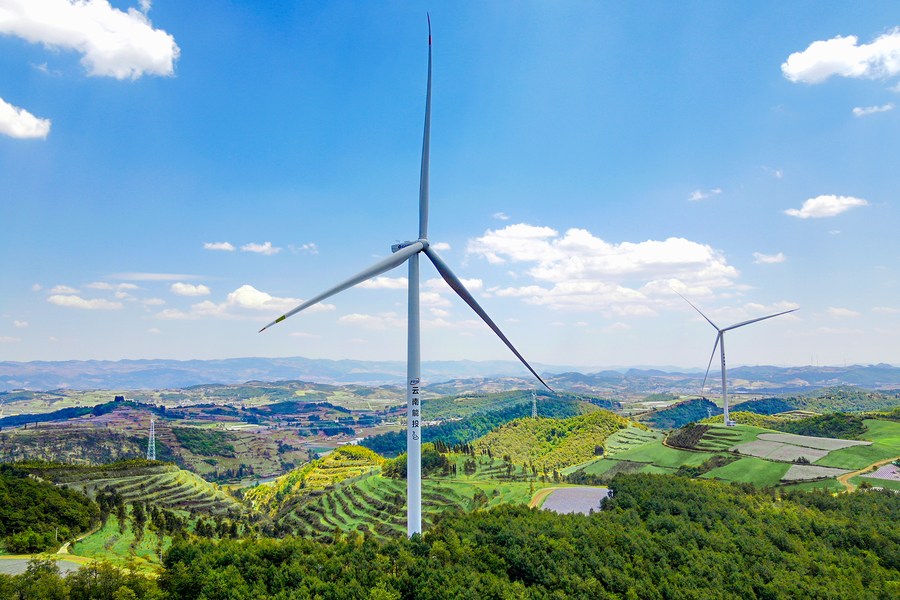We will stay firmly rooted in Chinese culture. We will collect and refine the defining symbols and best elements of Chinese culture and showcase them to the world. We will accelerate the development of China’s discourse and narrative systems, better tell China’s stories, make China’s voice heard, and present a China that is credible, appealing, and respectable.
习近平在首个全国生态日之际作出重要指示强调 全社会行动起来做绿水青山就是金山银山理念的积极传播者和模范践行者
发布时间:2023-08-16 09:05:23 | 来源:新华社 | 作者: | 责任编辑:丁素云习近平在首个全国生态日之际作出重要指示强调
全社会行动起来做绿水青山就是金山银山理念的积极传播者和模范践行者
丁薛祥出席主场活动开幕式并讲话
新华社杭州8月15日电 在首个全国生态日到来之际,中共中央总书记、国家主席、中央军委主席习近平作出重要指示强调,生态文明建设是关系中华民族永续发展的根本大计,是关系党的使命宗旨的重大政治问题,是关系民生福祉的重大社会问题。在全面建设社会主义现代化国家新征程上,要保持加强生态文明建设的战略定力,注重同步推进高质量发展和高水平保护,以“双碳”工作为引领,推动能耗双控逐步转向碳排放双控,持续推进生产方式和生活方式绿色低碳转型,加快推进人与自然和谐共生的现代化,全面推进美丽中国建设。
习近平希望全社会行动起来,做绿水青山就是金山银山理念的积极传播者和模范践行者,身体力行、久久为功,为共建清洁美丽世界作出更大贡献。
![1129803631_16920851750981n[1].jpg 1129803631_16920851750981n[1].jpg](http://images.china.cn/site1000/2023-08/16/103375711_bf0187f1-4a82-4434-9211-31f83bdda25d.jpg)
8月15日,首个全国生态日主场活动在浙江省湖州市举行。中共中央政治局常委、国务院副总理丁薛祥出席活动开幕式,传达习近平重要指示并讲话。新华社记者 岳月伟 摄
首个全国生态日主场活动15日在浙江省湖州市举行。中共中央政治局常委、国务院副总理丁薛祥出席活动开幕式,传达习近平重要指示并讲话。丁薛祥表示,党的十八大以来,以习近平同志为核心的党中央把生态文明建设作为关系中华民族永续发展的根本大计,开展了一系列开创性工作,决心之大、力度之大、成效之大前所未有,生态文明建设的成就举世瞩目,成为新时代党和国家事业取得历史性成就、发生历史性变革的显著标志。新时代新征程,要深入学习贯彻习近平生态文明思想,把建设美丽中国摆在强国建设、民族复兴的突出位置,以高品质生态环境支撑高质量发展,加快推进人与自然和谐共生的现代化。要持之以恒打好污染防治攻坚战,深入打好蓝天、碧水、净土保卫战,持续改善生态环境质量;坚持把绿色低碳发展作为解决生态环境问题的治本之策,加快形成节约资源和保护环境的空间格局、产业结构、生产方式、生活方式;坚持山水林田湖草沙一体化保护和系统治理,着力提升生态系统多样性、稳定性、持续性;积极稳妥推进碳达峰碳中和,做到在发展中降碳、在降碳中实现更高质量发展;持续推进生态环境治理体系和治理能力现代化,健全美丽中国建设保障体系。要以全国生态日主场活动为契机,进一步深化习近平生态文明思想的大众化传播,提高全社会生态文明意识,增强全民生态环境保护的思想自觉和行动自觉,推动形成人人、事事、时时、处处崇尚生态文明的良好社会氛围。
2023年6月28日,十四届全国人大常委会第三次会议通过决定,将8月15日设立为全国生态日。首个全国生态日主场活动由国家发展改革委联合中央宣传部、自然资源部、生态环境部等部门和浙江省人民政府共同举办,主题为“绿水青山就是金山银山”。
Xi makes instructions on China's first National Ecology Day
HANGZHOU, Aug. 15 (Xinhua) -- Chinese President Xi Jinping has urged the whole society to vigorously promote and act as role models in practicing the concept that lucid waters and lush mountains are invaluable assets.
Xi, also general secretary of the Communist Party of China (CPC) Central Committee and chairman of the Central Military Commission, made the instructions as the country marks its first National Ecology Day on Aug. 15.
Ecological conservation is of vital importance for the sustainable development of the Chinese nation, Xi said, calling it a major political issue that concerns the mission and purpose of the CPC as well as a major social issue that bears upon public wellbeing.
On the new journey of building a modern socialist country in all respects, efforts should be made to maintain strategic resolve in advancing ecological progress and promote high-quality development in sync with high-standard protection, Xi said.
With a focus on carbon peak and carbon neutrality, the country should facilitate the gradual transition from dual control over the amount and intensity of energy consumption to dual control over the amount and intensity of carbon emissions, Xi noted.
Efforts should be made to promote the transition towards green and low-carbon production methods and lifestyles, and accelerate the advancement of modernization featuring harmony between humanity and nature to build a Beautiful China in all respects, Xi said.
He called for concrete and constant efforts across the society to make greater contributions to jointly build a clean and beautiful world.
Xi's instructions were conveyed by Vice Premier Ding Xuexiang, a member of the Standing Committee of the Political Bureau of the CPC Central Committee, at the opening ceremony of an event marking National Ecology Day held Tuesday in Huzhou City, east China's Zhejiang Province.
Addressing the ceremony, Ding stressed the significance of building a Beautiful China, and called for more efforts to create a high-quality ecological environment to support high-quality development and accelerate the advancement of modernization featuring harmony between humanity and nature.
Ding urged grasping Tuesday's event as an opportunity to deepen the public's understanding of Xi Jinping's thought on ecological civilization and improve people's awareness and behavior in protecting the ecological environment.
Lawmakers adopted a decision to designate Aug. 15 as National Ecology Day at the third session of the Standing Committee of the 14th National People's Congress in June this year.
Chinese Vice Premier Ding Xuexiang, also a member of the Standing Committee of the Political Bureau of the Communist Party of China (CPC) Central Committee, speaks at the opening ceremony of an event marking National Ecology Day in Huzhou City, east China's Zhejiang Province, Aug. 15, 2023. The instructions of Chinese President Xi Jinping, also general secretary of the CPC Central Committee and chairman of the Central Military Commission, were conveyed by Ding at the opening ceremony. (Xinhua/Yue Yuewei)
An event marking National Ecology Day is held in the city of Huzhou, east China's Zhejiang Province, on Aug. 15, 2023. (Xinhua/Jiang Han)
An event marking National Ecology Day is held in the city of Huzhou, east China's Zhejiang Province, on Aug. 15, 2023. (Xinhua/Jiang Han)
An event marking National Ecology Day is held in the city of Huzhou, east China's Zhejiang Province, on Aug. 15, 2023. (Xinhua/Jiang Han)

This aerial photo taken on April 13, 2023 shows Yucun Village of Anji County, Huzhou City, east China's Zhejiang Province.(Xinhua/Weng Xinyang)
BEIJING, Aug. 15 (Xinhua) -- China marks its first National Ecology Day on Tuesday, designated to enhance public awareness and actions to protect the ecological environment, as part of the country's efforts to pursue harmony between humanity and nature.
Under the guidance of President Xi Jinping, China has seen historic changes on ecological conservation, upholding the belief that lucid waters and lush mountains are invaluable assets, a core concept of Xi's thought on ecological civilization.
Making instructions on National Ecology Day, Xi, also general secretary of the Communist Party of China (CPC) Central Committee and chairman of the Central Military Commission, urged the whole of society to vigorously promote and act as role models in practicing it.
BETTER LIVING ENVIRONMENT
Xi proposed the concept on Aug. 15, 2005, when he was visiting Yucun Village in east China's Zhejiang Province, where he praised the villagers' decision to shut down limestone mines and cement factories after the industry caused severe damage to the local environment. Xi was then the Party chief of Zhejiang.
Yucun has now successfully turned to green industries, including ecological tourism, for more sustainable development, providing a fine example of the sweeping environmental changes across the nation.
Since the 18th CPC National Congress, China has taken a series of groundbreaking steps on ecological conservation, with unprecedented determination, intensity and effectiveness.
In 2015, a revised environmental protection law came into effect, with the provisions hailed as "the strictest" in history. In 2017, pollution control was identified as one of China's "three tough battles," along with poverty relief and risk control. In 2018, China incorporated ecological civilization into its Constitution for the first time.
Concrete measures have also been taken in the past decade, including the ecological protection "red line," the establishment of a system of river chiefs and lake chiefs, as well as the systemic protection and management of mountains, rivers, forests, farmland, lakes, grass and sand.
Due to tenacious efforts, China's PM2.5 density fell 57 percent from 2013 to 2022, while the annual number of days with serious air pollution dropped sharply by 92 percent.
Planting trees has become a common practice for the Chinese people, and the country has created the world's largest area of planted forests, with its forest coverage rate more than doubling from 12 percent in the early 1980s to over 24 percent last year.
Water quality has also shown remarkable improvement, with 84.9 percent of surface water sections achieving the excellent quality grade, approaching the levels seen in developed countries.
To keep improving the quality of our ecological environment, we should keep doing what we are doing now, and go deep in a bid to keep our skies blue, waters clear and lands pollution-free, Xi said at a national conference on ecological and environmental protection held in July.
MORE ABUNDANT WILD SPECIES
Believing that biodiversity makes Earth full of vigor and vitality and lays the foundation for human survival and development, Xi has led China in achieving steady progress on addressing biodiversity loss.
Starting from 2021, China has imposed a 10-year ban on fishing in the key waters of the Yangtze River basin, with 228,000 fishermen on 110,000 boats relinquishing their nets. Xi said the cost of the policy was not small, "but it is worthwhile to protect the ecology of the whole basin."
The fishing ban has already achieved solid progress on ecological conservation. The Yangtze finless porpoises, an endangered species known as the "giant panda of the water," have been spotted more frequently in Poyang Lake, Dongting Lake and the middle and lower reaches of the Yangtze River.
In the Jianli section of the Yangtze River, the number of fish roes produced by the four major Chinese carps during the breeding season surged from less than 100 million to 7.87 billion.
Across the country, wildlife on plateaus and mountains, as well as in the rainforests, is also making a comeback amid the country's efforts to build the world's largest national park system.
The first batch of national parks established in 2021, with a protected land area of 230,000 square km, are home to nearly 30 percent of the key terrestrial wildlife species found in the country, while the authenticity and integrity of the ecosystems in these parks are under effective protection.

This aerial photo taken on May 16, 2023 shows wind turbines of Honghe Yongning wind power plant in Honghe Hani and Yi Autonomous Prefecture, southwest China's Yunnan Province.(Yunnan Provincial Energy Investment Group/Handout via Xinhua)
LOW-CARBON SHIFT
Xi has on many occasions stressed efforts to advance the transition to low-carbon development, as China joins the world to address climate change.
China has pledged to have CO2 emissions peak before 2030 and achieve carbon neutrality before 2060, representing the biggest cut in carbon emission intensity in the shortest period of time that the world has ever seen.
In doing so, China has taken the initiative, instead of doing it passively, Xi once said.
A cleaner energy system is an important part of China's low-carbon endeavors. The country has developed the world's largest clean coal-burning power generation base, built up the world's highest capacity of installed wind and photovoltaic power, and established the world's largest carbon market for greenhouse gas emissions.
China's energy intensity -- the amount of energy consumed per unit of GDP -- decreased 26.4 percent in the past decade, according to the National Development and Reform Commission, adding that the country has exceeded its target for reducing carbon emission intensity pledged to the international community.
As China's green shift gathers pace, Xi has called for concrete and constant efforts across the society to make greater contributions to jointly build a clean and beautiful world.
In September 2021, China announced that it would stop building new coal-fired projects overseas, pledging that it would step up support for other developing countries in developing green and low-carbon energy.
"We only have one Earth. Protecting the ecological environment and pushing sustainable development are our joint obligations," Xi once said.

